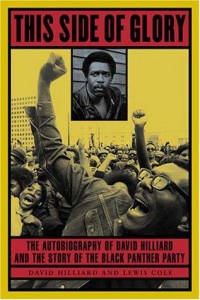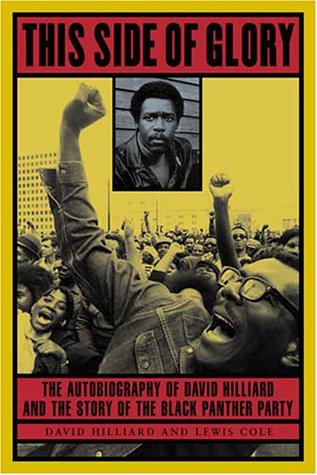This Side of Glory: The Autobiography of David Hilliard and the Story of the Black Panther Party
David Hilliard and Lewis Cole
438pp. Little, Brown and Company. $20.
The Occupy movement that has consumed the attention of America’s news media, city governments, and populace for the past few months is not the first to attempt—or succeed—to change social order and political discourse in America. To the confusion of media, politicians, and the public, the Occupy movement has declared itself leaderless and non-hierarchical. This stands in high contrast to previous social movements, many of which have featured powerful leadership.
The Black Panther Party of the 1960s and early 1970s was one such movement. Under the dynamic leadership of Minister of Defense Huey P. Newton, Chairman Bobby Seale, and Chief of Staff David Hilliard, the Black Panther Party built a militant black leftist organization that espoused revolutionary socialism, built cadres and alliances across the country and the world, attracted the undivided attention of the American FBI and CIA, and dramatically changed national discourse around race, economics, and revolution.
In his autobiography This Side of Glory: The Autobiography of David Hilliard and the Story of the Black Panther Party, David Hilliard details his own life history, from childhood until the death of his close friend and fellow Panther Huey Newton. Hilliard also traces the inspiring, tragic, and politically intricate history of the Party itself. He uses his own narrative to explain the ideological formation of the Party as well as the circumstances behind its rise and fall.
Formative Years
Hilliard was born in 1942 in Alabama. The youngest of twelve children, he describes a vibrant childhood family life growing up in the black South. This Side of Glory traces the thread of Panther ideology from its first origins in Hilliard’s childhood. Hilliard describes his admiration for his father, a hard-working man who taught his sons that “who hit you—white or black, big or little—didn’t matter; we couldn’t come home unless we’d stood up for our self-respect.” Taught by his parents to strike back against those trying to intimidate or take advantage of him, the young David Hilliard grew up with violence as “part of his value system,” as he describes.
In elementary school, he moved to Oakland, California, where proved to the other boys in town that he would not take an affront lightly. Hilliard’s propensity to fight boys bigger than himself earned him the respect of the young Huey P. Newton. The culture of violence in Oakland extended to interpersonal interactions among Hilliard’s family members and friends and to the “thuggish” and racist Oakland police.
Becoming increasingly angry at a school system that expected black students to fail in academics, a young David Hilliard met Malcolm X for the first time. Malcolm X led Hilliard to a mosque. Hilliard was immediately struck by Malcolm X’s discourse of racial oppression and Black Power, and his first political action soon after was an unsuccessful attempt to convince his brother June to divorce his light-skinned wife.
Hilliard watched the LA race riots of 1965 with a mixture of bemusement and envy, and began reading books about Black Power and about socialism. This Side of Glory recalls the first time Newton told Hilliard about his new idea for a political organization, telling him, “We’re gonna be the personification of Malcolm X’s dreams.” The men set out to “organize the brothers,” to deploy violence as a tool of political mobilization and power.
Black Panther Ideology
In 1966, Huey Newton and a friend Bobby Seale began to patrol the streets of Oakland with guns and law books. They intended to stop the police from unlawfully harassing black men, empowering the black community to speak out against inequality and injustice. Newton quickly recruited Hilliard to join the newly formed Black Panther Party for Self-Defense.
Under Newton’s “Ten Point Program,” the Panthers grew to include not only police patrols but also social programs and political activism. Their programs, like sickle-cell anemia testing and Free Breakfast for Children, filled in gaps where racist governmental policy had ignored the black community. They also rallied the violence and anger of black men on the streets, directing it against the racism of the Oakland government instead of against their own black community.
In the years to come, Newton, Hilliard, and the Party struggled with the line between self-defense and gratuitous violence. They attempted to channel the anger of the black community against the police, nicknamed “the pigs,” while dissuading members of the Party from committing unprovoked murders. For example, Hilliard describes a night when two frantic Party members pleaded with him for protection; they had just initiated a shoot-out with the police and told Hilliard, “Eldridge [one of the Party leaders] says we’re supposed to make moves on the pigs.” Hilliard attempted to explain to them that unprovoked violence could only hurt the Party, but the two men did not understand. Through anecdotes like this, This Side of Glory explores the difficulty of taming anger into a carefully regulated political tool and the question of when, and how much, violence can be justified.
Rise and Fall
After Newton’s imprisonment in 1967 for his involvement in a shootout with the police, Hilliard helped launch the Free Huey movement, which bolstered both national support for the Panthers. It also grew Hilliard’s own importance in the Party. Through tapes recorded in jail, Newton appointed Hilliard the Chief of Staff of the Party, a job that sent him around the country to educate new chapters in the Party’s Ten Point Program. Hilliard gained the respect of many around the country through his dedication and powerful organizing.
Hilliard was arrested in 1969 on charges of threatening the life of the President (he led a rally in a rousing chant of, “We will kill Nixon!”) He later spent four years in prison for his involvement in another police shooting.
At the same time, the FBI began to attack the Panther leadership structure under a covert program called COINTELPRO (Counter-Intelligence Program). Hilliard cites passages from a Senate investigation done on COINTELPRO’s illegal anti-Panther activities. Although Hilliard’s disproportionate focus on the FBI’s activities may gloss over preexisting tensions and problems within Party leadership, it provides a compelling explanation of how the FBI took advantage of mistrust within the Party to manipulate party leaders and put them in jail.
After getting out of jail, no longer officially a member of the Black Panther Party, Hilliard struggled for years to support his family, hold a steady job, and stay away from drugs and alcohol. Although he eventually cleaned up his life through an Alcoholics Anonymous program, Hilliard was now living within a black American culture that had shifted from politically militant to drugged-out and addicted.
Drugs and Women
At the same time, Hilliard uses This Side of Glory to analyze the internal conflicts that led to the ultimate downfall of the Party. In his autobiography, Hilliard deals frankly with the drug and alcohol abuse prevalent in the black community of the 1980s. He describes Huey Newton’s alcoholism and dependence on drugs as well his own addictions, and how these led to internal divisions and schism within the Party. At the end of the book, Hilliard denounces addiction as both a personal and societal issue: he explains that “Huey’s problem with chemical dependency represents all our weaknesses here in America… he’s a product of this society.” This Side of Glory concludes with a call to action against addiction for the black community on behalf of their loved ones and their entire race.
This message, however inspiring, reveals the large gap missing in This Side of Glory: Hilliard fails at critical self-reflection. Throughout the autobiography, Hilliard describes his abusive relationships. He frankly discusses his mistreatment of his wife, his lovers, his children and his grandchildren. Hilliard sometimes calls attention to his own hypocrisy: for example, he describes an instance in which he mistreated his wife and then turned around to scold another Party member for not respecting women, shouting at the other man, “We’re not out on the street in here. We respect everybody’s right to self-determination.” However, Hilliard seems to blame his abuses on alcohol, failing to explicitly denounce the sexism rampant in his own life. This failure at self-reflection reflects a grandiosity and lack of thoughtful criticism that seems to thread throughout the entire narrative.
Despite grandiosity, and perhaps even because of it, This Side of Glory provides a riveting account of the power of individual leaders of the Black Panther Party and how their actions and experiences shaped the entire social movement. David Hilliard’s autobiography is a striking perspective on the delicate balance between self-defense and murder, between anger and revolution, and between a community fueled by drugs and a community empowered by politics. Most interestingly, it lends unsurpassed insights into the making of a revolutionary leader and the ideology of leftist leadership.
